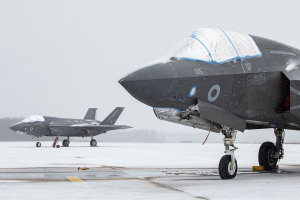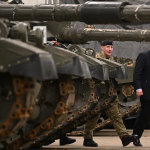Putin’s horrific and appalling escalation of his conflict in Ukraine has killed the UK’s Integrated Review in all but name. Although its strategic analysis was good, the capabilities it proposed are unable to defend us from the scale, type and immediacy of threats that we can all now see unfolding in Ukraine. HMG will almost certainly increase defence spending as a result, but too often such increases have been perceived as being wasteful and inefficient. In the current situation UK policy makers have a compelling duty to think competently and swiftly about maximising defence and security outcomes.
Defence Procurement
Senior British officers and MoD officials need to recognise their own failures in managing defence procurement. We should no longer accept a culture in which the costs of proposed programmes are too often “understated” or “overly optimistic.” This seems be motivated by a long-standing belief that once a programme has got the right approvals it should not be cancelled, regardless of changing circumstances. Expensive adaptations and alterations often become necessary to deliver what was originally presented as a low risk, low cost project. Those developing new proposals need to be more honest and transparent about uncertainties around requirement changes, technical challenges and cost growth, while policy makers across Whitehall should be willing to see higher costs in proposed new equipment programmes.
MoD’s paper Defence and Security Industrial Strategy is a good start, but more detail is needed on what technologies and capabilities must be retained by UK industry. If necessary this can be done confidentially but the process must have full buy in from other government departments. Claiming that this can’t be done because technology and security threats change is no longer acceptable.
There is also a long standing need for a much more professional approach to defence acquisition. Too often MoD procurement teams are negotiating with a defence company that has significantly more expertise and experience.
There is also the question of ministerial involvement in the procurement process. In the past politicians have claimed that procurement decisions are subject to competition because of EU law but arguably what they really want the cheapest option regardless of the damage it does to the UK defence industrial base. Another example is ministers choosing companies because of their location in a marginal constituency. . . One change that might help is to ensure that ministerial decisions are based on company- blind recommendations. This would involve officials providing all of the usual detail, including security of supply issues, in relevant ministerial advice but without naming the companies involved.
Reform across other government departments is also urgently required. The Treasury’s Green Book which sets out criteria for government spending decisions was recently amended to take account of levelling up. However, it doesn’t seem to properly consider the issues raised by the MoD’s defence industrial strategy. There is also the problem that Treasury policy draws an arguably false distinction between investing in equipment (aka spending defined as Capital Departmental Expenditure Limits, of CDEL) and investing in people (aka spending defined as Resource Departmental Expenditure Limits, or RDEL). Departments are incentivised to put more resource into CDEL as this is seen as investment which leads to growth and this can then be used to justify using or even expanding Government debt. RDEL on the other hand is supposed to come from taxation and no politician likes to raise taxes. It is claimed that this leads to an over-emphasis on equipment and a lack of attention to key national security questions such as service pay and allowances. Both of these questions could be resolved rapidly given the right political will.

In addition, the FCDO and DIT need to re-consider our defence technology relationships with various states in the light of the attack on Ukraine. Should we develop closer defence industrial relationships with those states that have demonstrated their willingness and capacity to support Ukraine with the right type and scale of equipment? Should we also be alert to those states that had or have defence industrial partnerships with Russia? For instance, if we see evidence of significant Chinese military equipment being used by Russia how should we respond?
New Operational Deployments
Given the new strategic threat level we should immediately offer to make our recent doubling of our military deployment in Estonia permanent until the circumstances have changed. However, we also need to enhance our abilities to rapidly reinforce the Baltic states in the event of a Russian invasion. This means improving our capabilities to mitigate the effect of Russian anti-air and anti-ship systems. Such an effort would likely be alliance-wide and create opportunities for burden-sharing with our allies on the specific tasks of defending Baltic air and maritime space.
Let us also be honest with our public – without breaching our security guidelines – about the UK’s ability to conduct high intensity warfare. Numerous Defence Select Committee and National Audit Office reports set out in some detail the capability gaps we have. Increasing defence expenditure is a necessary but insufficient policy change. We must focus on defence outputs, such as bringing forward the creation of a war-fighting division to at least 2025, if not earlier. While doing so, we must not forget other critical outputs such as significantly improving the retention of skilled service personnel.
Cross-Whitehall
The Integrated Review intended to achieve coordinated and timely cross departmental action. The authors quite rightly highlighted this as key to enhancing our security. Has it delivered during the current crisis?
Non-MoD departments and the relevant National Security Council sections have some questions to answer. Why do we still not have a commonly agreed list between the UK, the US and the EU of Russian individuals and entities to be sanctioned? Why didn’t the UK and our NATO allies start supplying lethal weaponry to Ukraine at an earlier stage. How are we coordinating with our allies in engaging with East Asian nations who are so critical to the global economy and to NATO’s security? Why did we appear to have inadequate contingency plans in place to respond to the need to support Ukrainian refugees?
Long term planning and coordination should be underway already. It seems evident that the Ukrainian Government and its people will continue to fight even if the entire territory of Ukraine is occupied by Russian forces. The legal, security and other policy issues relating to how we continue to provide material and financial support to Ukrainian resistance in the coming years – or even decades – need to be considered and agreed within HMG and NATO as soon as possible. Defence is only one aspect of what should a fully integrated and long-term commitment to the liberation of Ukraine.
Legislative change – actual and potential
Legislative responses to the crisis such as the introduction of the Economic Crimes Bill are welcome. We already have mechanisms to enable courts to hear evidence from intelligence sources such as the Special Immigration Appeals Commission and therefore, if needed, prosecutions under the new legislation could use sensitive sources. There is also a strong case for extending the use of prison sentences for breaching the new Bill. At present many of the new offences seem to only result in financial penalties which may not produce the deterrent effect needed amongst relevant audiences such as highly paid lawyers and accountants.

What we also need to prepare for is the immediate introduction of new legislation in the event of a Russian attack on NATO itself. This is now a more likely scenario and worst case planning is needed across government. It may be that there is already draft legislation that can be swiftly tabled and passed by Parliament in that event or perhaps HMG has the necessary powers under existing legislation to introduce the required regulatory powers. Just like similar powers introduced at speed in both World Wars, in the event of an Article V warfighting scenario – a de facto Third World War – the government will need to be able to seize private property and detain key individuals to protect UK national security.
Humanitarian Impact
While acting to constrain and oppose the Russian state, we must also take steps to support the Russian people. They are not responsible for Putin’s actions and they continue to suffer under his brutal regime. At the very least Western governments should offer funding for humanitarian aid delivered by the right NGOs to mitigate the impact of Western sanctions on ordinary Russians. This can be done by delivering practical support and aid on the ground, such as medical care and pharmaceuticals, directly to Russian people in need. While this would need the agreement of Russian authorities – an unlikely prospect – even more modest supporting efforts, conducted at reach, could make a meaningful difference. For example, developing, publishing and promoting a detailed plan that identifies Russian communities in need, and practical proposals for local NGOs to meet those needs could be done very rapidly by civil society organisations. Sanctioned oligarchs could then be encouraged to apply for licences, as allowed by UK regulations, to donate some of their seized assets to meet those needs.
There is a continuing debate about the contribution of people to people links between NATO and Warsaw Pact states to the ending of the Cold War. While their impact remains unclear, in the current circumstances it is worth considering whether there is an appetite for reviving these links within European and North American civil society. Putin and his supporters claimed that Western governments are behind all of the popular uprisings against Kremlin-backed regimes. It is therefore understandable but arguably regrettable that some Western political and cultural figures were reluctant to be too engaged in supporting Russian opposition activists. That reluctance must now be discarded. Western governments should not back any particular figure or organisation amongst those Russians struggling for freedom and democracy. The same does not apply to other significant leaders in Western societies.
Above all our message to the Russian people about common values must be very clear and consistent. We see Putin and his regime as a threat to world peace and security but only the Russian people should decide whether or not he stays in office. At the moment they do not have that choice.
Conclusion
Since the end of the Second World War successive UK governments have failed to match their strategic intent with the funding and policies needed to deliver it. There are lessons various senior officers and policy makers have learnt from struggles ranging from the withdrawal from India in 1948 to the retreat from Kabul in 2021. We know quite a lot about what works and what doesn’t work when it comes to protecting UK national security. However, we have a fairly consistent record of failing to implement the lessons we have learned from spending so much blood and treasure. Making matters worse, we have consistently avoided establishing mechanisms to monitor how and when these lessons have been implemented.
What we need now is a clear, transparently funded, policy aligned decades long, strategic plan that has cross party agreement to radically improve UK national security. Developing and implementing this must be done in close coordination with our allies and partners, and we have to ensure that there is truly integrated cross departmental action to deliver it. No plan can remain unchanged by events, and we need to be willing to rapidly and radically alter course as the facts change; but by the same token, not be beholden to short-termism. Putin and his cronies present a major threat to the UK but there are others, such as a more aggressive Chinese government, a far more lethal pandemic or a potentially accelerated rate of climate change. It may not be easy to restore effective long term strategic planning by the UK government, but it is evidently essential.

Josh Arnold-Forster
Josh Arnold-Forster was a Special Adviser to Defence Secretary John Reid 2005 and is a political consultant. He is writing in a personal capacity.


